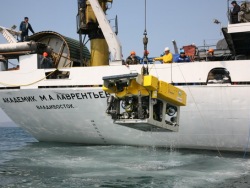National Scientific Center of Marine Biology launches large-scale expedition to explore deep-sea ecosystems of the Emperor Seamount Chain

On July 17, 2021, the scientific team from the A. V. Zhirmunsky National Scientific Center of Marine Biology FEB RAS went to a chain of seamounts, known as the Emperor Seamount Chain, aboard the research vessel Akademik M.A. Lavrentyev (cruise 94) to study deep-sea ecosystems in the central Pacific Ocean. The team is directed by Tatyana Dautova, Lead Researcher, Scientific Head of the Laboratory of Deep-Sea Research at the NSCMB FEB RAS.
The expedition’s mission is to investigate the functional structure of deep-sea ecosystems, trophic relationships and biochemical and genetic diversity in populations of benthic organisms. Data on the major indicator species for highly valuable benthic ecosystems – corals and sponges - will help to determine their spatial distribution patterns in the Pacific Ocean and to develop science-based measures for living marine resource management.
In addition to standard research vessel equipment, the ship also carries a Comanche remotely operated vehicle system with a depth rating of 6,000 meters, fitted with Schilling Orion hydraulic manipulators and samplers for collecting samples of deep-sea organisms.
Besides scientists from the NSCMB FEB RAS, the crew of the expedition comprises staff members of Far Eastern Federal University ̶ the flagship scientific and educational center of the Russian Far East ̶ and the Pacific Research Fisheries Centre (TINRO-Centre) as well as researchers from key scientific institutions within the Russian Academy of Sciences: the P. P. Shirshov Institute of Oceanology RAS, which is a national leader in oceanological research, including deep-sea exploration, the V.I. Il'ichev Pacific Oceanological Institute FEB RAS, the Institute of Marine Technology Problems FEB RAS and the V.I. Vernadsky Institute of Geochemistry and Analytical Chemistry RAS.